The Originals Vol. 16 – Elvis edition 3
In the third Elvis special in this series we look at the originals of That’s All Right (1954), My Baby Left Me (1956), His Latest Flame (1961), Cant’ Help Falling In Love With You (1961) and Viva Las Vegas (1964) — though the last of these is not really an Elvis cover.
Charles Gilibert – Plaisir d’amour (1908).mp3
Elvis Presley – Can’t Help Falling In Love (1961).mp3
This is the song which ignorant callers to radio stations tend to request by the title “Wise Man Say” (and, if fortune likes to piss on you, in UB40’s ghastly incarnation). The fictitious title is not entirely off the mark: the lyrics were co-written by a pair of alleged mafia associates, Hugo Peretti and Luigi Creatore, with George David Weiss. Peretti and Creatore were partners with mafioso Mo Levy in the Roulette record label (named after the game that “Colonel” Tom Parker was addicted to), which the FBI identified as a source of revenue for the Genovese crime family. The trio also wrote the lyrics for The Lion Sleeps Tonight, a song whose sorry saga will feature in a future instalment in this series.
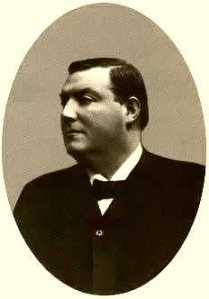
Charles Gilibert
The melody of Can’t Help… borrows from the old French love song Plaisir d’amour, composed in 1785 by Johann Paul Aegidius Martini. It was first recorded in 1902 by Monsieur Fernand (real name Emilio de Gogorza), and subsequently by a zillion others, including in 1908 by the baritone Charles Gilibert (1866-1910). It may be a little more accurate to describe Can’t Help Falling In Love as an adaptation rather than as a cover. While the similarities are sufficiently evident to mark Plaisir d’amour as the basis for the song, it certainly has been innovated on.
The song was adapted in 1961 for Elvis’ Blue Hawaii movie. Reportedly, neither the film’s producers nor Elvis’ label, RCA, liked the song much. Elvis, however, insisted on recording it. Elvis often was his best A&R man, and so it was here. The song was initially released as the b-side of Rock-A-Hula Baby (you do know how that one goes, no?). In the event, Can’t Help became the big hit, reaching #2 in the US and #1 in the UK. It also became a signature song for Elvis who would invariably include it in his concerts. Indeed, it was the last song he performed live on stage in Indianapolis on 26 June 1977, Elvis’ final concert.
Also recorded by: Perry Como (1962), The Lettermen (1963), We Five (1965), Bobby Solo (as Te ne vai, 1967), Aphrodite’s Child (as I Want To Live, 1969), Andy Williams (1970), Al Martino (1970), Marty Robbins (1970), Bob Dylan (1973), The Stylistics (1976), Johnny Farago (1976), Shirley Bassey (1977), Baccara (1977), Ral Donner (1979), Klaus Nomi (1983), Corey Hart (1986), Lick the Tins (1986), David Keith with The T. Graham Brown Band (1988), The Triffids (1989), Hall & Oates (1990), Julio Iglesias (1990), Luka Bloom (1992), UB40 (1993), James Galway (1994), Michael Chapdelaine (1995), Celine Dion (1995), Richard Marx (1995), David Thomas and Two Pale Boys (1997), Sammy “Sax” Mintzer (1997), Neil Diamond (1998), Nato Ghandi (1999), Hi-Standard (2001), Pearl Jam (2001), Eels (2001), A*Teens (2002), Anne Murray (2002), Erasure (2003), Tuck & Patti (2004), Michael Bublé (2004), Mägo de Oz (as Todo Irá Bien, 2004), Rick Astley (2005), Joseph Williams (2006), Andrea Bocelli (2006), Barry Manilow (2006), The Skank Agents (2008), Blackmore’s Night (2008), Ingrid Michaelson (2008) a.o.
——————————
Del Shannon – His Latest Flame (1961).mp3
Mort Shuman – His Latest Flame (1961).mp3
Elvis Presley – His Latest Flame (1961).mp3
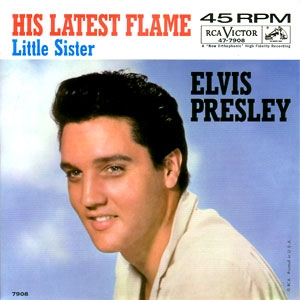 With it’s Bo Diddley-inspired guitar riff and flamenco-meets-Rock ‘n’ Roll feel, 1961’s (Marie’s The Name) His Latest Flame served as a welcome, albeit temporary, break from Elvis’ succession of easy listening fare such as It’s Now Or Never, Surrender and Are You Lonesome Tonight (though within a few months, he’d top the charts with another standard ballad, Can’t Help Falling In Love). Like these songs, His Latest Flame was not an original.
With it’s Bo Diddley-inspired guitar riff and flamenco-meets-Rock ‘n’ Roll feel, 1961’s (Marie’s The Name) His Latest Flame served as a welcome, albeit temporary, break from Elvis’ succession of easy listening fare such as It’s Now Or Never, Surrender and Are You Lonesome Tonight (though within a few months, he’d top the charts with another standard ballad, Can’t Help Falling In Love). Like these songs, His Latest Flame was not an original.
 The song was written by Doc Pomus and Mort Shuman, who wrote some 20 Elvis songs — including His Latest Flame’s b-side, Little Sister — as well as hits for acts such as The Drifters (Save The Last Dance For Me) and Dion (Teenager In Love). Although reportedly written specifically for Elvis, His Latest Flame was first offered to Bobby Vee, who turned it down. Del Shannon recorded the song in May 1961, with a view to releasing it as a follow-up single for his big hit Runaway. In the event, he decided to run with “Hats Off To Larry” instead. His Latest Flame was released on the Runaway With Del Shannon LP in June. The same month Elvis recorded his version, which was released in the US in August. Due to the arcane method of compiling the US charts, the His Latest Flame peaked at #4 and its flip side, Little Sister (another Pomus/Shuman composition) at #5. It topped the charts in Britain.
The song was written by Doc Pomus and Mort Shuman, who wrote some 20 Elvis songs — including His Latest Flame’s b-side, Little Sister — as well as hits for acts such as The Drifters (Save The Last Dance For Me) and Dion (Teenager In Love). Although reportedly written specifically for Elvis, His Latest Flame was first offered to Bobby Vee, who turned it down. Del Shannon recorded the song in May 1961, with a view to releasing it as a follow-up single for his big hit Runaway. In the event, he decided to run with “Hats Off To Larry” instead. His Latest Flame was released on the Runaway With Del Shannon LP in June. The same month Elvis recorded his version, which was released in the US in August. Due to the arcane method of compiling the US charts, the His Latest Flame peaked at #4 and its flip side, Little Sister (another Pomus/Shuman composition) at #5. It topped the charts in Britain.
Shuman tended to tout his co-composition by way of demos on which he sang himself. The demo for His Latest Name is much closer to Elvis’version than Shannon’s, a less smooth, more soulful interpretation which has something of a mariachi band feel, using brass to accentuate the Diddley-style riff (which the Smiths famously sampled 24 years later on Rusholme Ruffians).
Also recorded by: Richard Anthony (1961), Ronnie McDowell (1978), The Residents (1989), El Vez (1992), Scorpions (1993), The Sun Gods (1999), Misfits (2003), Morrissey (as part of a medley, 2005)
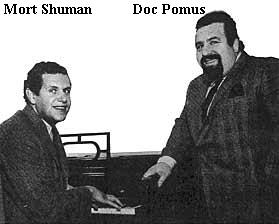
Mort Shuman – Viva Las Vegas (1963).mp3
Elvis Presley – Viva Las Vegas (1964).mp3
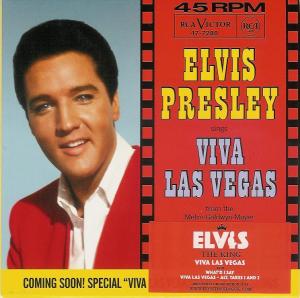 Doc Pomus and Mort Shuman also wrote the title song for Elvis’ 1964 movie vehicle, the title of which presages the singer’s future image (just think of the nauseating cliché of rhinestone-jumpsuited Elvis impersonators with comedy shades administering nuptial vows in a tacky plastic chapel in Vegas, the image of Elvis which threatens to destroy our boy’s rich legacy). The song has become one of the most popular from Elvis’ fallow mid-’60s period. Oddly, initially it was only the b-side to the lead single, the cover of Ray Charles What’d I Say (MP3 here). Playing guitar on Viva Las Vegas was a little-known session musician named Glen Campbell. The Mort Shuman version is the demo version, so Viva Las Vegas is not really a cover.
Doc Pomus and Mort Shuman also wrote the title song for Elvis’ 1964 movie vehicle, the title of which presages the singer’s future image (just think of the nauseating cliché of rhinestone-jumpsuited Elvis impersonators with comedy shades administering nuptial vows in a tacky plastic chapel in Vegas, the image of Elvis which threatens to destroy our boy’s rich legacy). The song has become one of the most popular from Elvis’ fallow mid-’60s period. Oddly, initially it was only the b-side to the lead single, the cover of Ray Charles What’d I Say (MP3 here). Playing guitar on Viva Las Vegas was a little-known session musician named Glen Campbell. The Mort Shuman version is the demo version, so Viva Las Vegas is not really a cover.
In 2002, the city of Las Vegas approached Elvis Presley Enterprises, the behemoth that controls (or at least tries to control) all Elvis-related matters, with a view to using Viva Las Vegas as its official song. In a merry-go-round of idiocy, EPE demanded too high a fee, even though the copyrights for the song had reverted to the estates of Pomus and Shuman (who died within three months of one another in early 1991) in 1993. The city of Las Vegas apparently didn’t bother to check who actually owned the song and negotiate a deal with them. It might be, of course, that Vegas wanted to use Elvis’ voice, which EPE possibly do control. If so, then Vegas must take a very dim view of the talents on offer among its growing population of Cliché Elvis Impersonators.While Vegas did not get to adopt the song, it was used by the pharmaceutical company (which Elvis had supported so enthusiastically) Pfizer to flog Viagra — Viva Viagra!
Also recorded by: Ral Donner (1979), Dead Kennedys (1980), The Residents (1989), Nina Hagen (1989), Bruce Springsteen (1990), ZZ Top (1992), Shawn Colvin (1995), Big Johnson (1995), Boxer (1997), Ann-Margaret (as Viva Rock Vegas, 2000), Dread Zeppelin (2004), The Thrills (2004), The Grascals with Dolly Parton (2005), Los Derrumbes (2005), Jim Belushi & the Sacred Hearts (2005), Spinballs (2007) a.o.
——————————
Arthur ‘Big Boy’ Crudup – That’s All Right (1946).mp3
Elvis Presley – That’s All Right (Mama) (1954).mp3
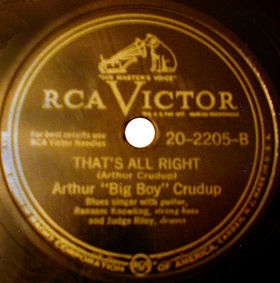 This is the song that changed Rock ‘n’ Roll forever. Young Elvis was in the Sun studios in Memphis, auditioning for the legendary Sam Phillips (in other accounts the story is set, more credibly, during the first recording session). Elvis, the story goes, was failing the audition, having crooned one ballad after another in Dean Martin mode. It was not the sound Phillips was looking for. During a break (or at the end of the session), Elvis starting goofing around with his guitar, singing That’s Allright, Arthur ‘Big Boy’ Crudup’s blues number from 1946. Session musicians Scotty Moore and Bill Black joined in. Sam Phillips later recalled: “The door to the control room was open, the mics were on, Scotty was in the process of packing up his guitar, I think Bill had already thrown his old bass down — he didn’t even have a cover for it — and the session was, to all intents and purposes, over. Then Elvis struck up on just his rhythm guitar, ‘That’s all right, mama..,’ and I mean he got my attention immediately. It could have been that it wouldn’t have sold ten copies, but that was what I was looking for!”
This is the song that changed Rock ‘n’ Roll forever. Young Elvis was in the Sun studios in Memphis, auditioning for the legendary Sam Phillips (in other accounts the story is set, more credibly, during the first recording session). Elvis, the story goes, was failing the audition, having crooned one ballad after another in Dean Martin mode. It was not the sound Phillips was looking for. During a break (or at the end of the session), Elvis starting goofing around with his guitar, singing That’s Allright, Arthur ‘Big Boy’ Crudup’s blues number from 1946. Session musicians Scotty Moore and Bill Black joined in. Sam Phillips later recalled: “The door to the control room was open, the mics were on, Scotty was in the process of packing up his guitar, I think Bill had already thrown his old bass down — he didn’t even have a cover for it — and the session was, to all intents and purposes, over. Then Elvis struck up on just his rhythm guitar, ‘That’s all right, mama..,’ and I mean he got my attention immediately. It could have been that it wouldn’t have sold ten copies, but that was what I was looking for!”
 Eleven days before the single was released on 19 July 1954, Memphis radio DJ Dewey Phillips played it seven times in a row by popular request. In an on air interview, he asked Elvis (whom, according to legend, he first called Elton Preston) which high school he had attended — a euphemistic way of clarifying for his listeners that Elvis was in fact white. Elvis has often been accused of hijacking black music, turning it white. If that was the effect, it was not Elvis’ plan. Here was a boy with a real affinity for R&B (as well as for gospel, country and the crooners). In 1956 he said: “The coloured folks been singing it and playing it just like I’m doin’ now, man, for more years than I know… I used to hear old Arthur Crudup bang his box the way I do now and I said if I ever got to the place where I could feel what old Arthur felt, I’d be a music man like nobody ever saw.”
Eleven days before the single was released on 19 July 1954, Memphis radio DJ Dewey Phillips played it seven times in a row by popular request. In an on air interview, he asked Elvis (whom, according to legend, he first called Elton Preston) which high school he had attended — a euphemistic way of clarifying for his listeners that Elvis was in fact white. Elvis has often been accused of hijacking black music, turning it white. If that was the effect, it was not Elvis’ plan. Here was a boy with a real affinity for R&B (as well as for gospel, country and the crooners). In 1956 he said: “The coloured folks been singing it and playing it just like I’m doin’ now, man, for more years than I know… I used to hear old Arthur Crudup bang his box the way I do now and I said if I ever got to the place where I could feel what old Arthur felt, I’d be a music man like nobody ever saw.”
Also recorded by: Marty Robbins (1954), Carl Perkins (1958), Blind Snooks Eaglin (1962), Scotty Moore (1964), Gram Parsons’ International Submarine Band (1968), Albert King (1970), Rod Stewart (1971), Jimmy Ellis (1972), Merl Saunders, Jerry Garcia, John Kahn & Bill Vitt (1973), William Robertson (1977), Merle Haggard (1977), Ral Donner (1979), The Maines Brothers (1981), Ronnie Hawkins (1983), Paul McCartney (1988), Albert Lee (1991), Vince Gill (1992), Home Coockin’ (1997), Nikolaj Christensen (1997), Tyler Hilton (2005), Curtis Stigers (2005), Monster Klub (2007), Dread Zeppelin (2008)
——————————
Arthur ‘Big Boy’ Crudup – My Baby Left Me (1949).mp3
Elvis Presley – My Baby Left Me (1956).mp3
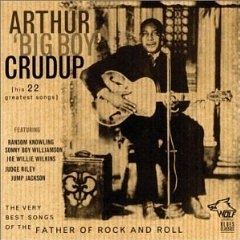 Elvis would record two more Crudup songs, My Baby Left Me and So Glad You’re Mine. If My Baby Left Me, which he recorded in 1949, sounds a lot like That’s Allright, it is because Crudup had a limited number of tunes which he adapted with new lyrics (usually also recycled). By coincidence, the man whose song set Elvis up with a career start at Sun Records had previously recorded for RCA (on their Bluebird subsidiary), the record company with which Elvis would break big. Crudup fought for the rest of his life to receive due royalties, making his living as a bootlegger and field labourer. In 1971, an agreement for $60,000 was agreed with Melrose Publishers, who proceeded to blankly refuse paying up. Crudup died penniless in 1974 at the age of 68.
Elvis would record two more Crudup songs, My Baby Left Me and So Glad You’re Mine. If My Baby Left Me, which he recorded in 1949, sounds a lot like That’s Allright, it is because Crudup had a limited number of tunes which he adapted with new lyrics (usually also recycled). By coincidence, the man whose song set Elvis up with a career start at Sun Records had previously recorded for RCA (on their Bluebird subsidiary), the record company with which Elvis would break big. Crudup fought for the rest of his life to receive due royalties, making his living as a bootlegger and field labourer. In 1971, an agreement for $60,000 was agreed with Melrose Publishers, who proceeded to blankly refuse paying up. Crudup died penniless in 1974 at the age of 68.
Elvis recorded My Baby Left Me in January 1956, during the same New York session which produced Blue Suede Shoes. It was released as the flip side of I Want You, I Need You, I Love You in May that year.
Also recorded by: Johnny Hallyday (as Tu me quittes, 1964), Dave Berry (1964), Scotty Moore (1964), Creedence Clearwater Revival (1970), Loggins & Messina (1975), Dave Edmunds (1977), Ronnie McDowell (1978), Geraint Watkins & The Dominators (1979), John Hammond (1982)
The Originals – Elvis edition 1
The Originals – Elvis edition 2
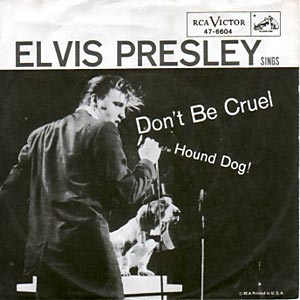 Before the session, the story goes, RCA had procured the first recording of the Leiber/Stoller composition, Big Mama Thornton’s blues rendition. Everybody was aghast: they thought it was horrible, unable to comprehend why Elvis would want to record that, as Gordon Stoker of the vocal backing group The Jordanaires later recalled. Stoker and the other puzzled people in the studio obviously did not watch TV. A month before the recording session, Elvis had performed the song on The Milton Berle Show, more or less the way he was going to record it on 2 July (
Before the session, the story goes, RCA had procured the first recording of the Leiber/Stoller composition, Big Mama Thornton’s blues rendition. Everybody was aghast: they thought it was horrible, unable to comprehend why Elvis would want to record that, as Gordon Stoker of the vocal backing group The Jordanaires later recalled. Stoker and the other puzzled people in the studio obviously did not watch TV. A month before the recording session, Elvis had performed the song on The Milton Berle Show, more or less the way he was going to record it on 2 July (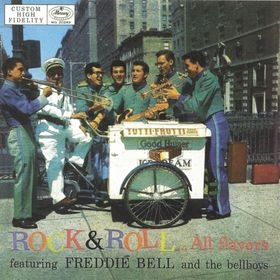 The truth is that Elvis didn’t base his version on Big Mama Thornton at all, but on the cover by Freddie Bell and the Bellboys, An Ital0-American band he had seen during his discouraging concert engagement in Vegas in April/May 1956. Having ascertained that Bell wouldn’t mind, Elvis quickly included Hound Dog in his setlist. He probably was aware of Thornton’s version, and perhaps heard some of the country covers that had been released. But Elvis’ Hound Dog is entirely a reworking of the Bellboys’, incorporating their sound and modified lyrics (“Cryin’ all the time” for “Snoopin’ round my door”, “You ain’t never caught a rabbit, and you ain’t no friend of mine” for “You can wag your tail, but I ain’t gonna feed you no more”), but happily dispensing with the lupine howls.
The truth is that Elvis didn’t base his version on Big Mama Thornton at all, but on the cover by Freddie Bell and the Bellboys, An Ital0-American band he had seen during his discouraging concert engagement in Vegas in April/May 1956. Having ascertained that Bell wouldn’t mind, Elvis quickly included Hound Dog in his setlist. He probably was aware of Thornton’s version, and perhaps heard some of the country covers that had been released. But Elvis’ Hound Dog is entirely a reworking of the Bellboys’, incorporating their sound and modified lyrics (“Cryin’ all the time” for “Snoopin’ round my door”, “You ain’t never caught a rabbit, and you ain’t no friend of mine” for “You can wag your tail, but I ain’t gonna feed you no more”), but happily dispensing with the lupine howls. Bell and his band enjoyed a mostly undistinguished recording career, with only one real hit, Giddy Up A Ding Dong (which was much bigger in Europe than it was in the US), also in 1956. Bell got no writing credit for Hound Dog. The writing credit remained entirely with Jerry Leiber and Mike Stoller, who were still R&B-obsessed teenagers when they were commissioned by the producer Johnny Otis to write a song for Big Mama Thornton in 1952. They did so in 15 minutes (when the song became a million-seller for Elvis, Otis claimed co-authorship. He lost that case). Thornton’s recording became a #1 hit on the R&B charts in 1953 (
Bell and his band enjoyed a mostly undistinguished recording career, with only one real hit, Giddy Up A Ding Dong (which was much bigger in Europe than it was in the US), also in 1956. Bell got no writing credit for Hound Dog. The writing credit remained entirely with Jerry Leiber and Mike Stoller, who were still R&B-obsessed teenagers when they were commissioned by the producer Johnny Otis to write a song for Big Mama Thornton in 1952. They did so in 15 minutes (when the song became a million-seller for Elvis, Otis claimed co-authorship. He lost that case). Thornton’s recording became a #1 hit on the R&B charts in 1953 ( Three years after Thornton’s hit, Stoller honeymooning on board of the sinking Andrea Doria. His life was spared (and, like Leiber, he is still with us), and returning to New York, he was greeted at the pier by Leiber with the news that Hound Dog had become a smash hit. “Mama Thornton?” Stoller asked. “No, some white kid named Elvis Presley,” replied Leiber. The songwriters, R&B purists, resented Elvis’ version. When, inevitably, they were commissioned to write for Elvis a year later, for the Jailhouse Rock film, they were not particularly happy. As a form of revenge, Leiber wrote for Elvis to sing the line in the title track: “you’re the cutest little jailbird I ever did see.” The prison in Jailhouse Rock was not co-ed. When they finally met Elvis, the songwriters realised that Elvis was a kindred spirit who genuinely shared their love for R&B, and they became good friends. Stoller even appeared in the film, as a piano player.
Three years after Thornton’s hit, Stoller honeymooning on board of the sinking Andrea Doria. His life was spared (and, like Leiber, he is still with us), and returning to New York, he was greeted at the pier by Leiber with the news that Hound Dog had become a smash hit. “Mama Thornton?” Stoller asked. “No, some white kid named Elvis Presley,” replied Leiber. The songwriters, R&B purists, resented Elvis’ version. When, inevitably, they were commissioned to write for Elvis a year later, for the Jailhouse Rock film, they were not particularly happy. As a form of revenge, Leiber wrote for Elvis to sing the line in the title track: “you’re the cutest little jailbird I ever did see.” The prison in Jailhouse Rock was not co-ed. When they finally met Elvis, the songwriters realised that Elvis was a kindred spirit who genuinely shared their love for R&B, and they became good friends. Stoller even appeared in the film, as a piano player.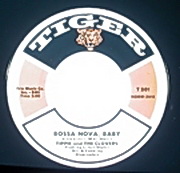 Another Leiber & Stoller composition, Bossa Nova Baby has been unjustly regarded by some as a bit of a displeasing novelty number from an Elvis movie (1963’s Fun In Acapulco). Even Elvis is said to have been embarrassed by it. If so, he had no cause: it may not be a bossa nova — it’s too fast for that — but it has a infectious tune and a genius keyboard riff which begs to be sampled widely. Perhaps it was the lyrics which had Elvis allegedly shamefaced, but the lines “she said, ‘Drink, drink, drink/Oh, fiddle-de-dink/I can dance with a drink in my hand’” are not much worse than some of the doggerel our man was forced to croon in his movie career as singing racing driver/pineapple heir/bus conductor. Or perhaps Elvis was embarrassed by the idea of including a notional bossa nova number in a movie set in Mexico.
Another Leiber & Stoller composition, Bossa Nova Baby has been unjustly regarded by some as a bit of a displeasing novelty number from an Elvis movie (1963’s Fun In Acapulco). Even Elvis is said to have been embarrassed by it. If so, he had no cause: it may not be a bossa nova — it’s too fast for that — but it has a infectious tune and a genius keyboard riff which begs to be sampled widely. Perhaps it was the lyrics which had Elvis allegedly shamefaced, but the lines “she said, ‘Drink, drink, drink/Oh, fiddle-de-dink/I can dance with a drink in my hand’” are not much worse than some of the doggerel our man was forced to croon in his movie career as singing racing driver/pineapple heir/bus conductor. Or perhaps Elvis was embarrassed by the idea of including a notional bossa nova number in a movie set in Mexico.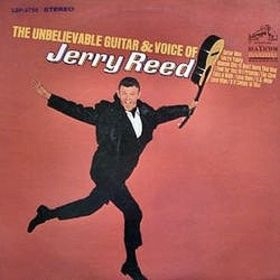 Jerry Reed was a country singer who toiled for a dozen years before scoring a hit in 1967 with Tupelo Mississippi Flash — a song about Elvis. The same year Elvis chose to record Reed’s Guitar Man (the composer is listed as Jerry Hubbard, the singer’s real surname), and Reed played guitar on it. In 1968, Elvis also had a hit with Reed’s US Male, originally written in 1966. Reed, who died last August, had enjoyed some success as a songwriter before (such as Johnny Cash’s A thing called love) and later became a three-time Grammy winner, including one for his 1970 LP of duets with occasional Elvis associate Chet Atkins, and part-time movie actor, usually as a Burt Reynolds sidekick.
Jerry Reed was a country singer who toiled for a dozen years before scoring a hit in 1967 with Tupelo Mississippi Flash — a song about Elvis. The same year Elvis chose to record Reed’s Guitar Man (the composer is listed as Jerry Hubbard, the singer’s real surname), and Reed played guitar on it. In 1968, Elvis also had a hit with Reed’s US Male, originally written in 1966. Reed, who died last August, had enjoyed some success as a songwriter before (such as Johnny Cash’s A thing called love) and later became a three-time Grammy winner, including one for his 1970 LP of duets with occasional Elvis associate Chet Atkins, and part-time movie actor, usually as a Burt Reynolds sidekick.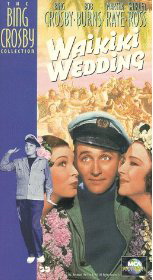 We’ll take a look at the more famous hit from Elvis’ 1961 movie Blue Hawaii — one of his most popular and the one with his best-selling soundtrack — in the next Elvis Originals Special on Friday.
We’ll take a look at the more famous hit from Elvis’ 1961 movie Blue Hawaii — one of his most popular and the one with his best-selling soundtrack — in the next Elvis Originals Special on Friday.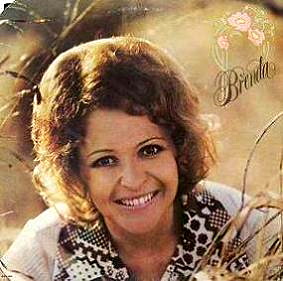 Depending on where you live and how old you are, this may be Elvis’ song or Willie Nelson’s, or perhaps the Pet Shop Boys’ (who had a hit with it in late 1987 after earlier performing it on a TV special to mark the 10th anniversary of Elvis’ death). Originally it was Brenda Lee’s, released in May 1972. It was not a big hit for her, reaching only #45 in the country charts. Somehow Elvis heard it and found the lyrics expressed his emotions at a time when the marriage to Priscilla was collapsing. He recorded it later in 1972. Released as the b-side to the top 20 hit Separate Ways, Always On My Mind was a #16 hit in the country charts. In the UK, however it was a top 10 hit, and became better know in Europe than in the US.
Depending on where you live and how old you are, this may be Elvis’ song or Willie Nelson’s, or perhaps the Pet Shop Boys’ (who had a hit with it in late 1987 after earlier performing it on a TV special to mark the 10th anniversary of Elvis’ death). Originally it was Brenda Lee’s, released in May 1972. It was not a big hit for her, reaching only #45 in the country charts. Somehow Elvis heard it and found the lyrics expressed his emotions at a time when the marriage to Priscilla was collapsing. He recorded it later in 1972. Released as the b-side to the top 20 hit Separate Ways, Always On My Mind was a #16 hit in the country charts. In the UK, however it was a top 10 hit, and became better know in Europe than in the US.
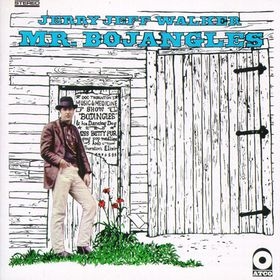 There is no truth to the old chestnut that Mr Bojangles tells the story of the great Bill Robinson. Folk/country singer Jerry Jeff Walker, who wrote and first recorded the song, tells the story of being in a New Orleans holding cell for public disorderliness with, among others, a street dancer (a white one, because cells were segregated). These public performers were generically nicknamed Bojangles (after Robinson). This man told his tales of life and of his grief for his dog. Urged on by the other cellmates, he proceeded to give them a tap dance. In 1968, three years after the incident, Walker recorded the song about that experience. Mr Bojangles is by far his most famous contribution to popular music. The second-most important would be to inspire Townes van Zandt to start writing songs.
There is no truth to the old chestnut that Mr Bojangles tells the story of the great Bill Robinson. Folk/country singer Jerry Jeff Walker, who wrote and first recorded the song, tells the story of being in a New Orleans holding cell for public disorderliness with, among others, a street dancer (a white one, because cells were segregated). These public performers were generically nicknamed Bojangles (after Robinson). This man told his tales of life and of his grief for his dog. Urged on by the other cellmates, he proceeded to give them a tap dance. In 1968, three years after the incident, Walker recorded the song about that experience. Mr Bojangles is by far his most famous contribution to popular music. The second-most important would be to inspire Townes van Zandt to start writing songs. Pino Donaggio is best known as a composer of the scores for films such as Don’t Look Now, Carrie and Dressed To Kill. But before that, he was a big pop star in Italy, having abandoned the classical training he received as a teenager (and which prepared him for his soundtrack career) for pop after performing with Paul Anka in the late 1950s.
Pino Donaggio is best known as a composer of the scores for films such as Don’t Look Now, Carrie and Dressed To Kill. But before that, he was a big pop star in Italy, having abandoned the classical training he received as a teenager (and which prepared him for his soundtrack career) for pop after performing with Paul Anka in the late 1950s.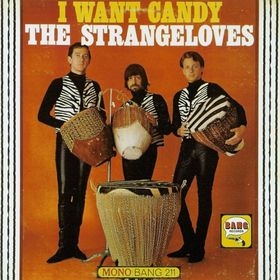 I Want Candy originally was a Bo Diddley-inspired 1965 US #11 hit for the Strangeloves, a joke project of songwriter/producers Bob Feldman, Jerry Goldstein and Richard Gottehrer (the latter would go on to produce the likes of Blondie and the Go-Go’s, and co-founded the Sire label on which Madonna launched her career). The conceit was that the Strangeloves were Australian brothers who had made a fortune by crossbreeding a new type of sheep, named after Gottehrer. The gag did not acquire much public traction, but it did present a problem when I Want Candy’s success imposed the demand for live performances by the Strangeloves. The three producers solved the problem by putting together a band of session musicians. Their adventures on the road will form part of the story in the next entry.
I Want Candy originally was a Bo Diddley-inspired 1965 US #11 hit for the Strangeloves, a joke project of songwriter/producers Bob Feldman, Jerry Goldstein and Richard Gottehrer (the latter would go on to produce the likes of Blondie and the Go-Go’s, and co-founded the Sire label on which Madonna launched her career). The conceit was that the Strangeloves were Australian brothers who had made a fortune by crossbreeding a new type of sheep, named after Gottehrer. The gag did not acquire much public traction, but it did present a problem when I Want Candy’s success imposed the demand for live performances by the Strangeloves. The three producers solved the problem by putting together a band of session musicians. Their adventures on the road will form part of the story in the next entry.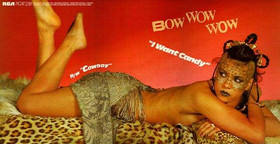
 Earlier in the series, The McCoys featured with their original of Sorrow, famously covered by David Bowie. Oddly enough, the group’s 1965 signature hit, Hang On Sloopy, was a cover version, of the Vibrations’ 1964 US top 30 hit My Girl Sloopy, written by the legendary Bert Berns (who also had an association with the Strangeloves) and Wes Farrell. The Vibrations were a soul group from Los Angeles which kept going well into the 1970s; one if their members, Ricky Owens, even joined the Temptations very briefly. Several of their songs are Northern Soul classics (which basically means that they were so unsuccessful that the records are rare).
Earlier in the series, The McCoys featured with their original of Sorrow, famously covered by David Bowie. Oddly enough, the group’s 1965 signature hit, Hang On Sloopy, was a cover version, of the Vibrations’ 1964 US top 30 hit My Girl Sloopy, written by the legendary Bert Berns (who also had an association with the Strangeloves) and Wes Farrell. The Vibrations were a soul group from Los Angeles which kept going well into the 1970s; one if their members, Ricky Owens, even joined the Temptations very briefly. Several of their songs are Northern Soul classics (which basically means that they were so unsuccessful that the records are rare).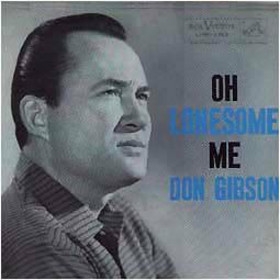
 When Ray Charles released his seminal Modern Sounds in Country and Western Music (in 1962, at the height of the civil rights struggle), he let it be known that country music has soul — an elementary truth which the haters of the genre have too easily ignored. Don Gibson, hardly the prototype for sweaty, sexy party music, had soul. You can hear it on his 1958 original of I Can’t Stop Loving You, one of 150 country songs shortlisted for the Ray Charles LP. If anything, Ray Charles (and arranger Sid Feller) added Nashville schmaltz to the song. Indeed, it is the one song on the album that is still recognisably a country number. This wasn’t Charles’ first foray into country. A few years earlier he had recorded Hank Snow’s I’m Movin’ On.
When Ray Charles released his seminal Modern Sounds in Country and Western Music (in 1962, at the height of the civil rights struggle), he let it be known that country music has soul — an elementary truth which the haters of the genre have too easily ignored. Don Gibson, hardly the prototype for sweaty, sexy party music, had soul. You can hear it on his 1958 original of I Can’t Stop Loving You, one of 150 country songs shortlisted for the Ray Charles LP. If anything, Ray Charles (and arranger Sid Feller) added Nashville schmaltz to the song. Indeed, it is the one song on the album that is still recognisably a country number. This wasn’t Charles’ first foray into country. A few years earlier he had recorded Hank Snow’s I’m Movin’ On.






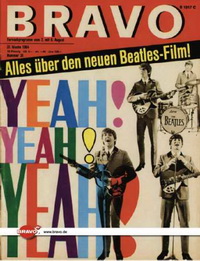 In this year’s monthly intros quizzes, we’ll continue the five-year cycle, starting in 1964 (next month will cover 1969 and so on). As always, twenty intros to hit songs from that year of 5-7 seconds in length. All where single releases that yeay, except the well-known first intro, and all were hits that year.
In this year’s monthly intros quizzes, we’ll continue the five-year cycle, starting in 1964 (next month will cover 1969 and so on). As always, twenty intros to hit songs from that year of 5-7 seconds in length. All where single releases that yeay, except the well-known first intro, and all were hits that year.

Recent Comments